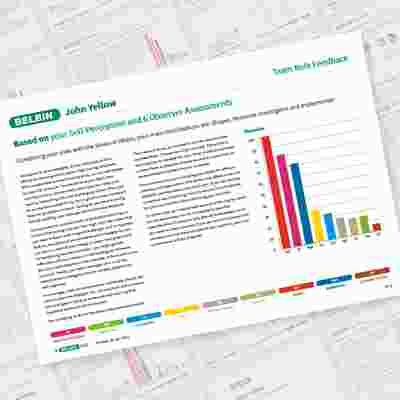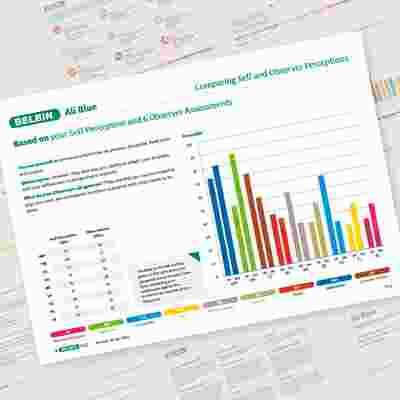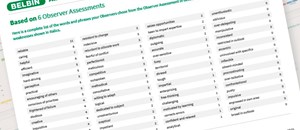A data-driven, people-centred framework
Belbin is a data-driven, people-centred framework for celebrating your strengths, discovering hidden talents and devising your personal development strategy.
Belbin enhances self-awareness by helping you to reflect on your own behaviours in different scenarios, and then inviting those you work with to provide observations of your contributions in the team.
The Belbin questionnaires are carefully composed to analyse your strengths, and to filter out social desirability and other influencing factors. When it comes to your others’ views of you, our algorithms ensure that feedback is discerning, balanced and constructive, and that one person is not allowed to influence your results unduly.
Your Belbin Individual report collates all this data, comparing your strengths according to your self-perception and to the contributions that others see.
This tailored report offers unique insights into your Team Role strengths, which can help you to clearly define your preferred working styles, better understand how others experience your behaviour, and create a personal development strategy to align the two.
How can Belbin help self-awareness?
The Belbin Individual reports and the importance of asking for feedback
Belbin Individual reports
Identifying our behavioural styles is the first step towards increasing self-understanding and building more effective working practices. Each individual needs to understand their key strengths and how to articulate how they prefer to work.
Why Observer feedback matters
To learn and understand ourselves better, we need to broaden our perspective – to look at ourselves through a new lens. It may sound obvious, but we need to move beyond what we already know. It’s important that we’re open to receiving new information; that we look for this information in the right places, and that we interpret it correctly, so we can act on it.
“We don’t see the world as it is, we see it as we are.”
Anaïs Nin
What is self-awareness?
But first, let’s begin by asking exactly what we mean by self-awareness.
Self-awareness involves being aware of different aspects of ourselves, including our characteristics, behaviours and feelings.
Self-aware individuals are more aware of the effects of their thoughts, emotions and actions.
They can objectively evaluate themselves, manage their emotions more effectively, align their behaviour with their values, and gain a deeper understanding of how they are perceived by others.
This makes room for growth and change which increase personal effectiveness.
Organisational psychologist and researcher, Tasha Eurich, explains that there are two different kinds of self-awareness: internal and external.
- Internal (or private) self-awareness is the ability to reflect on our own internal state. It represents how clearly we understand our own values, thoughts, aspirations, reactions and behaviours. Internal self-awareness requires an introspective focus, approaching our own feelings and reactions with curiosity.
- External (or public) self-awareness means understanding how we can appear to others. This is the kind of self-awareness which encourages us to behave within social norms, in ways that are socially acceptable.
We need both types. With only internal self-awareness, we become too introspective and fail to see our own weak spots. With only the external, we become people-pleasers and overlook what really matters to us.
In Eurich’s study, people who were more self-aware also experienced greater job satisfaction and a sense of personal and social control.
Leaders with higher external self-awareness tended to build stronger relationships, and were seens as more empathetic and effective in their role.
Those whose self-perception matched the views of others were more likely to empower, include and recognise others.
“Self-awareness isn’t one truth. It’s a delicate balance of two distinct, even competing, viewpoints.”
Tasha Eurich
The benefits of self-awareness
People who are self-aware:
- Build stronger relationships
- Experience greater job satisfaction
- Benefit from greater self-esteem
- Demonstrate greater levels of empathy
- Make better, more informed decisions
- Have a greater understanding of different perspectives
- Are freer from assumption and bias
- Are more proficient at regulating emotions
- Experience lower levels of stress
- Enjoy greater control over outcomes

How do I become more self-aware?
In answer to this question, John Williams, Chief Executive of Institute of Leadership, proposes the ‘Three-As model’.
- Ask – Make a point of soliciting feedback from others.
- Accept – Be open-minded and accept criticism at face value
- Act – Take tangible action in response
In other words, simply asking for feedback will not achieve the desired result: learning and growth. In order to be effective, feedback must be received, understood and then applied.
David Klein, the founder of student-loan lender, CommonBond, points out that CEOs in particular need to take into account the mindset required to request and make best use of employee feedback. This includes considering the methods for feedback likely to produce the most constructive, insightful responses for the person to consider.
In our experience, open or qualitative feedback can be difficult to collate and extrapolate from, whilst purely numerical data can be difficult to contextualise and apply. Belbin offers a middle ground: combining rigorous statistical analysis with accessible, applicable results that can be used towards a personal development strategy.
The self-awareness gap and the limitations of self-reporting
Many personality tests (or psychometric tests) rely solely on self-reporting – asking the individual to answer questions relating to their personality traits or characteristics. But there are limitations to this approach when it comes to increasing self-awareness.
Although most people believe they are self-aware, only 10-15% of the people studied by the Eurich group actually fitted the criteria. This is called the self-awareness gap.
Results from self-reporting tests simply reflect the individual’s own view back at them.
Because of the self-awareness gap, this view is likely to be distorted, or at least, accurate but limited.
A report of this kind might reinforce the individual’s ideas about themselves – creating a kind of echo chamber – but offers fewer opportunities for learning and growth.


Belbin is different
Belbin is different, because it focuses on behaviour, which can be observed by others.
As part of the Belbin process, individuals ask others for feedback via the Observer Assessments.
This evidence-based approach situates behaviour in a work context and makes the findings more applicable from the outset, since behaviour can be readily monitored and changed where desired.
Research shows that power hinders self-awareness too: the further we progress in our careers, the more difficult it becomes for those who work for us to provide candid feedback.
This is where some in-house 360-degree feedback programs fall down. If people can’t be sure of who will see their responses and how they might be used, they are unlikely to feel comfortable offering honest feedback.
For example, consider a leader who sees themselves as a sociable, enthusiastic individual who builds consensus. Others might consider the leader to be competitive, authoritative and demanding.
The Belbin methodology positions Observer feedback within the Team Role framework, with careful checks and balances to ensure that feedback is considered and constructive.
The Belbin Individual report examines areas of consensus and difference, offering a starting-point for your self-development journey.
Why we use Belbin
"The Observer Assessments are essential, I think for the programme that we use it on the most, a big part of it is raising self awareness. We've used lots of tools over the years and we had to go back to using Belbin because with the behavioural element, the observations, it just heightens peoples self-awareness." Gary Shewan.
Strengthen your strengths: why strengths-based feedback works with our wiring
Whilst many organisations adopt a competencies-based approach to feedback and personal development, research indicates that building on our strengths is a far more effective strategy than ‘remediation’ – expending energy to work our weaknesses up to an ‘acceptable level’.
According to a Gallup survey, attempts to find and fix weaknesses led to negative employee experiences, lower levels of engagement and mediocre performance.
By contrast, developing people's strengths enhances self-awareness, self-confidence and productivity.
Gallup reported 7% to 23% higher employee engagement, an 8% to 18% increase in performance and 20% to 73% lower attrition.
According to an article published in Harvard Business Review, “learning is less a function of adding something that isn’t there than it is of recognising, reinforcing, and refining what already is”.
Learning happens when we discover how to do something better by expanding, or adding nuance to, our existing understanding.

Neurons and synaptic connections
Neurologically, we grow more neurons and synaptic connections where we already have most of them.
In other words, we grow most readily in our areas of greater ability. When others feed back on our strengths, this galvanises learning.
However, when we are asked to focus on our weaknesses, according to psychology and business professor, Richard Boyatzis, the strong negative emotion produced by criticism ‘inhibits access to existing neural circuits and invokes cognitive, emotional, and perceptual impairment”.
In other words, we perceive critical feedback as a threat and this narrows our brain activity.
We are often encouraged to ‘go outside our comfort zones’, but in fact, research suggests that this sends our brains into survival mode. Our sympathetic nervous system – our fight or flight response – is activated.
By contrast, when we focus on our goals and aspirations, and strategies to achieve them, the parasympathetic nervous system comes into play. This allows the growth of new neurons, a greater sense of wellbeing, and benefits to our cognitive and perceptual functions, including creativity and productivity.
Belbin is a strengths-based tool
Belbin is a strengths-based tool which delivers feedback in terms of the nine Belbin Team Roles – nine clusters of behaviour needed to facilitate team performance.
As well as our top Team Role strengths, we each have a number of manageable roles – sometimes ‘hidden talents’ – which can be cultivated as and when required.
We also have a number of roles that we don’t tend to adopt, because they fall well outside our comfort zone.
Rather than insisting that each person play all roles, the Belbin methodology and reports are focused on honing strengths and developing strategies to mitigate our weaknesses, such as seeking out team members with complementary strengths.
This approach makes for more effective use of the ‘talent capital’ within the team, as well as promoting an understanding of behavioural diversity and the value of different approaches.

There’s a 'me' in team: team-centred personal development
Research shows that how we handle feedback can have a profound effect on team performance.
Specifically, individualistic feedback led to more internal competition, whereas feedback related to the group increased collaboration.
Jan K Woike at the Max Planck Institute for Human Development in Germany and Sebastian Hafenbrädl of IESE Business School in Spain, conducted a laboratory experiment with 112 students and 28 managers with at least 7 years’ professional experience. They grouped participants and invited them to participate in a classic public goods game.
They discovered that internally-focused feedback distorted people’s perceptions.
It prompted people to perceive even collaborative situations as competitive. Not only did participants concentrate more narrowly on ensuring their own individual success, but they were willing to forgo this success to ensure that others didn’t win.
Belbin’s democratic, evidence-based approach puts the focus on behaviour
Belbin reports are derived from, and centred on, the team, so that personal growth and more effective collaboration are within the team’s locus of control.
There are plenty of opportunities for personal development, but situated within a working context. This makes the findings easier to apply, and ensures that individuals can better understand the contribution they make to the team as a whole.
This boosts engagement in both the Belbin process and any resulting strategies.
It encourages individuals to consider how they present themselves, and how internal and external self-awareness might be aligned to make them more effective at what they do.

How to use Belbin reports to raise self-awareness and increase personal effectiveness
Everyone has something to contribute to a team, but it can be difficult to establish and articulate exactly what that contribution might be. During this 45-minute webinar we take you through the NEW Belbin Individual report step by step, and explain how you can use it to help improve self-awareness and personal effectiveness.
This webinar will be useful if you use (or are thinking of using) the Belbin reports to help others identify and build on their strengths, and also for your own self-development.
Contact us
Please fill out the form and we'll be in touch.

Article
When do weaknesses become non-allowable?
At Belbin, we focus on strengths: the unique cocktail of behavioural contributions each person can bring to a team, and how we can best fit these contributions together to maximise engagement and performance and give the team what it needs for success at each stage.

Article
What happens when you’re stuck doing work that doesn’t come naturally?
Teams need all kinds of diversity, in order to survive. In an ideal world, teams would be designed for balance, not least in the kind of contributions individuals can make. But in real life, teams don’t always work that way.

Article
What are Observer Assessments?
Observer Assessments are fundamental to Belbin. Because understanding our behaviour – and acting upon our understanding – helps us to work smarter and become more engaged in what we do.